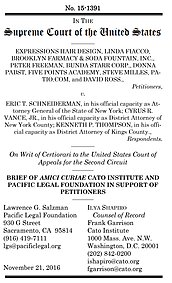Learn more about Cato’s Amicus Briefs Program.
In Federalist 10, James Madison warned of “a number of citizens, whether amounting to a majority or minority of the whole, who are united and actuated by some common impulse of passion, or of interest, adverse to the rights of other citizens or to the permanent and aggregate interests of the community.” These groups — “factions” in Madison’s terms — come together to seek concentrated benefits from favorable legislation and regulation rather than competing in the marketplace, while spreading the costs throughout society. While Madison conceded that such interests could not be stopped completely, he suggested that certain steps could be taken to mitigate the “effects” of these groups, and the damage that they can do to the public interest. The First Amendment is one such protection. The New York legislature, however, ignored the First Amendment rights of both merchants and consumers when — at the behest of the credit-card lobby — it passed a law restricting how retailers can convey pricing schemes, as well as the public’s right to know about them. New York’s no-surcharge law — like those in 10 other states — insulate credit-card companies from consumer knowledge about who is actually causing the higher prices on goods when they use their credit card (“swipe fees”). The law does this not by restricting the merchants’ ability to charge different prices as between cash and credit payments — that’s legal everywhere — but by regulating the communications about the different prices. To put it simply: the law allows merchants to offer “discounts” to cash-paying customers, but makes it a crime to impose economically equivalent “surcharges” on those who use plastic. By mandating how these merchants convey their pricing structure, New York is restricting speech on the basis of its content, which would seem to be an obvious First Amendment violation. A federal district court agreed — as have two other federal courts, including the U.S. Court of Appeals for the Eleventh Circuit when it struck down a similar Florida law. The district court held that the law “plainly regulates speech” — not conduct — by drawing a line between prohibited “surcharges” and permissible “discounts” based solely on words and labels. The Second Circuit disagreed, however, holding that the law regulates “merely prices,” not speech. Cato filed an amicus brief urging the Supreme Court to take up this important case, and the Court has agreed to do so. Cato, along with the Pacific Legal Foundation, have now filed as amici asking the Court to rule that collusion between business interests and state government can’t be used to circumvent constitutional rights. Indeed, the Framers sought to protect speech from the type of cronyism and rent-seeking the New York’s no-surcharge law manifests. We also argue that the Court should clarify that the First Amendment covers speech even if it involves commercial matters. When legislatures abridge these protections, judges should apply the highest form of scrutiny to these laws rather than limply deferring to majoritarian will. The law not only violates the First Amendment rights of merchants and consumers, however, but also — as often happens with laws based on cronyism — has disproportionate effects on lower-income individuals. When merchants are not allowed to effectively communicate the price difference between cash and credit, they will, in some instances, charge the higher credit price for users of both. This creates a perverse regressive subsidy from poorer consumers — who are more likely to use cash than those with a higher income — by making those cash users pay for swipe fees they could avoid if merchants could convey the price difference. The Framers foresaw — and sought to protect against — these types of cronyist effects, so the Supreme Court should make clear that the First Amendment will protect individuals from factions.



